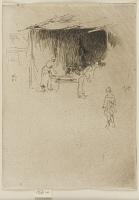Booth at a Fair | ||
| Number: | 257 | |
| Date: | 1886 | |
| Medium: | etching and drypoint | |
| Size: | 133 x 98 mm | |
| Signed: | butterfly at right | |
| Inscribed: | no | |
| Set/Publication: | no | |
| No. of States: | 1 | |
| Known impressions: | 6 | |
| Catalogues: | K.249; M.245; W.203 | |
| Impressions taken from this plate (6) | ||
KEYWORD
café, child, drink, fair, food, people, shop, stall.
TITLE
The title has always remained more or less the same, for example:
'A Booth at a Fair' (1886, Frederick Wedmore (1844-1921)). 4
'Booth at a Fair' (1887, Whistler). 5
Whistler's version, Booth at a Fair, is preferred.
'A Booth at a Fair' (1886, Frederick Wedmore (1844-1921)). 4
'Booth at a Fair' (1887, Whistler). 5
Whistler's version, Booth at a Fair, is preferred.
4: Wedmore 1886 A (cat. no. 203).
5: 27 July 1887, GUW #08677.
DESCRIPTION
A refreshment booth, with tables under an awning supported by poles, appears in the upper part of the plate. The entrance is well lit, and a woman stands at left, bending over the table with a tray of food and drink. Inside, to the right, are two people sitting in deep shadow, and outside, to their right, there are two women standing. Nearer to the viewer, at right, stands a child looking at the booth.
SITE
According to Wedmore, writing in 1886, 'In the upper part of the plate is seen a canvas-covered booth, at a French country fair.' 6 Wedmore consulted the artist in July 1886 about his catalogue of Whistler's etchings, writing: 'now that I know your Etchings, I feel their quality very fully. The best will live with the best of Rembrandt's.' 7 Wedmore may have obtained information on the site from Whistler shortly after that.
6: Wedmore 1886 A (cat. no. 203).
7: 10 July 1886, GUW #06290.
DISCUSSION
This is one of two 'booths' etched by Whistler, the other being Booth, Market Place, Loches [425]. Both 'booth' subjects were listed by Whistler and his wife. 8 In both cases the 'booth' is a table sheltered by an awning, selling food, either to carry-out or sit down and eat in a fairly basic environment.
This is also one of many compositions in which the emphasis is on a shaded space, doorway or other shadowed area, as for example in The Smithy [239], The Village Sweet Shop [266], Cottage Door [252], Railway Arch, American Square [316], Melon Shop, Houndsditch [355] and Double Doorway, Sandwich [322].
